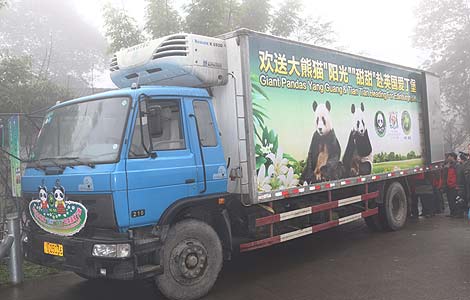A journey worth its weight
Updated: 2011-12-09 08:21
By Fu Jing (China Daily)
|
|||||||||
The average annual growth of China's imports in the 10 years has been about 20 percent, Lamy said. "It is a success story for China and also a success story for the rest of the world."
Lamy then asks rhetorically, "Now, did this happen without turbulence?" and gave a firm "No".
But no process of rapid economic growth and social reform happens without turmoil, he said. The changes had brought about upheavals that needed to be managed both in and outside China, with the political difficulties that entailed.
"So it has resulted in difficulties which have to be coped with through proper policy changes. This is what happened in China, and this is what happened in the rest of the world."
Despite upheavals, Lamy said, China had acted responsibly as a WTO member.
Over the past decade China has put great effort into reforming its public sector, the financial system and the legal system.
China had implemented its commitment through reforms to match and even surpass WTO rules on market access, intellectual property, anti-dumping and other trade practices.
China had made a contribution to the system as it opened its economy, improving the stability, predictability, transparency of a number of rules that favor trade and economic activities, enhance employment and growth.
"That is where we started. We are in the business of growing the pie through efficiency improvement, which economic growth is about. Economic growth is a sum of improvement of efficiency. So this has worked. Of course, not at no cost. Not without any problem. This is because this system needs to be adjusted through reform either within China or in the other parts of the world."
Whether the change is rapid enough is another matter, he said.
There are different views on this. Overall, China is just as willing as anyone in the WTO to abide by rules on trade and business, Lamy said.
China is a peculiar case, he said, because of the size of its economy and the speed of its growth, unprecedented in human history. That is what distinguishes China from other emerging economies such as those of India, Indonesia and Brazil, he said.
In 20 years China would account for 20 percent of the world's economy, while India would account for 5 percent.
He realized that China does not want to be singled out. However, "if you have big muscles and big speed, that will bring real changes".
As for China's market economy status, he said for the WTO whether it is a market economy only counts when calculating the price of dumping. And in the case of China, when it joined the WTO 10 years ago other members said China would not be given market economy status for the anti-dumping margin calculation until 2016.
"This is part of the terms of accession ... "
On the reform of China's State-owned enterprises, he said: "When China joined, it had to reform in order to move to a modern market-based system, and this process is still ongoing."
Despite generally positive comments on China's entry into the WTO, Lamy is pessimistic about the economic outlook. The unfolding global economic crisis will be "less violent but unfortunately durable" compared with that of 2008-09 because global leadership lacked the capacity to deal with it.
He also forecast that global trade growth next year would be less than that of this year.
Lamy said the outlook for the global economy had worsened considerably in recent months, and risks and uncertainties were increasing, especially as the European sovereign debt crisis worsened, after encouraging signals of recovery late last year.











